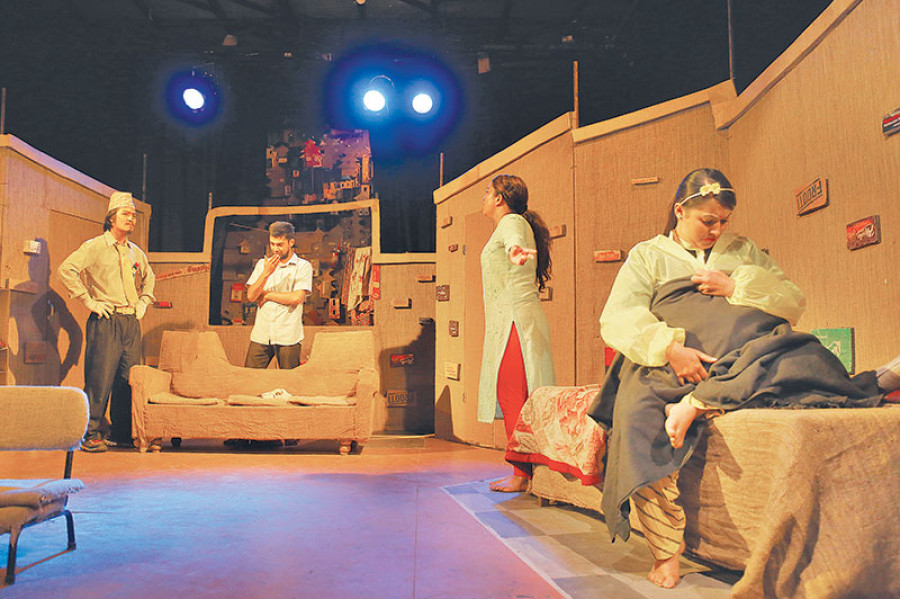Miscellaneous
Bull’s eye
It’s no news that Kathmandu’s theatregoers have a penchant for slapstick humour. Give them some and they will embrace it with hearty laughs even if the execution is sometimes half-baked. This has led to, as some critics have pointed out, directors often forcibly inserting humour where it is not warranted, breaking up a play’s rhythm and taking it off into tangents.
Timothy Aryal
It’s no news that Kathmandu’s theatregoers have a penchant for slapstick humour. Give them some and they will embrace it with hearty laughs even if the execution is sometimes half-baked. This has led to, as some critics have pointed out, directors often forcibly inserting humour where it is not warranted, breaking up a play’s rhythm and taking it off into tangents.
Good news is that Mandala Theatre’s latest production, Sakeko Tiraula Natra Firima (adapted from Italian playwright Dario Fo’s 1974 farce Non Si Paga! Non Si Paga!), packs in plenty of crowd-pleasing sequences that are not disjointed from the narrative but form the crux of the play instead. And the reception, at least on the day I attended, was reciprocal, with Mandala’s premises reverberating with laughter throughout the length of the hour-and-a-half long play. The author of the original play Dario Fo, at his Nobel Prize acceptance remarks in 1997, said: “Theatre that makes people laugh is the theatre of human reason” and by that standard Mandala’s adaptation was a resounding success.
The original play is set in Italy in 1974 where the nation is grappling with an economic crisis that has led to a double-pronged price hike and raise in tax rates, making it impossible for the common people to eke out a living. In dealing with the issue, Fo, the great purveyor of laughter, approached it with a farcical interpretation that prompted the audience to laugh at their own misery. In Can’t Pay? Won’t Pay (the English translation on which Mandala’s production is based), Fo brought to stage a pressing concern of the time, yet almost half a century later the issue remains as relevant as ever.
Which is why, director Bikash Joshi’s excellent, if sometimes flawed, rendition of the play retains the comic genius of the original, providing yet another example of how Kathmandu’s fast-evolving theatre circuit is becoming ever more efficient in taking Western classics and making it our own.
In Mandala’s confined black box theatre, the audience is welcomed with the sound of drum roll, and as a blue key light diffuses on to the stage, you find yourself inside a messy room, which doubles as a kitchen and bedroom. Two housewives, Sarita and Pramila, enter the room, carrying bags full of stolen goods. The frenzy starts as Sarita (played by Sarita Giri) begins to explain to Pramila (Pramila Khanal) how she shoplifted the supplies during a riot at a supermarket. It’s a secret shared by the two housewives, not to be leaked to their piously ethical husbands who work as taxi drivers. But then, unexpectedly, Sarita’s husband, Anupam (played by Anupam Sharma), knocks on the door.
Before letting him in, Pramila has enough time to hide the goods under a coat, the result being Pramila’s protruded stomach, as if from pregnancy. This plot then veers towards the two striving to hide the stolen goods from their husbands and from the police and government officials (all played by Umesh Tamang), using clever tricks and cooking up lies which leads the whole situation go awry.
In what is an excellent choice of source material, Sakeko Tiraula Natra Firima deals with an all-too-familiar topic, that of rapid price hikes and its consequence on working-class families. In contextualising the play, the writer/director changes the profession of the husbands to taxi drivers. Both the actors, Baral and Anupam, sound and look natural, with Anupam’s deadpan dialogue delivery eliciting chuckles among even those familiar with the source material. Sarita and Pramila both work well in portraying housewives. The choice in casting the lead pair, that of Anupam and Sarita, however, is somewhat unmatched, due to age difference, even though the couple’s on stage chemistry more than makes up for the shortfall. Bikash Shrestha’s set design is minimal and tactful as well.
Sakeko Tiraula Natra Firima, however, is not a perfect production. The dialogue, which uses many Nepali ukhan-tukka as flourishes, is entertaining, but the play makes several glaring jumps in the narrative. For instance, the psychological transformation of the husbands—from once proclaiming, ‘I might be poor but I don’t exchange my honesty for money’ to bringing home stolen goods themselves—is not made clear. For audiences familiar with the source material, these tiny but important jumps might not amount to much, but for the uninitiated they can be confusing, stealing from the otherwise impeccable rhythm of the play.
Despite the inconsistencies, however, Sakeko Tiraula Natra Firima is one of the better adaptations of western classics into Nepali that has been staged. Leaving the theatre, you can’t help but ponder why more plays like this, rather than mechanical annual adaptations of Shakespeare, are produced more often.
It is also worth pointing out that, with no little irony, Mandala Theatre has hiked its ticket prices (from Rs 300 to Rs 500) for a play about inflation and price hikes. But hang in there; Sakeko Tiraula, Natra Firima is well worth it.
Sakeko Tiraula Natra Firima
Playwright/Director: Dario Fo/
Bikash Joshi
Actors: Sarita Giri, Anupam Sharma, Bijay Baral, Pramila Khanal,
Umesh Tamang
Theatre: Mandala Theatre, Anamnagar
Time: Every day, except Mondays, at 5:30 pm, until Aug 26.




 9.89°C Kathmandu
9.89°C Kathmandu










